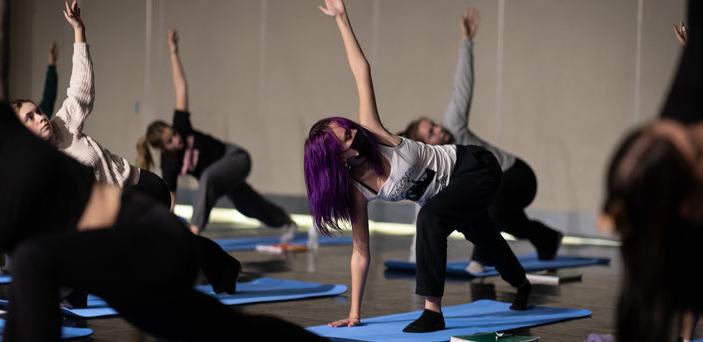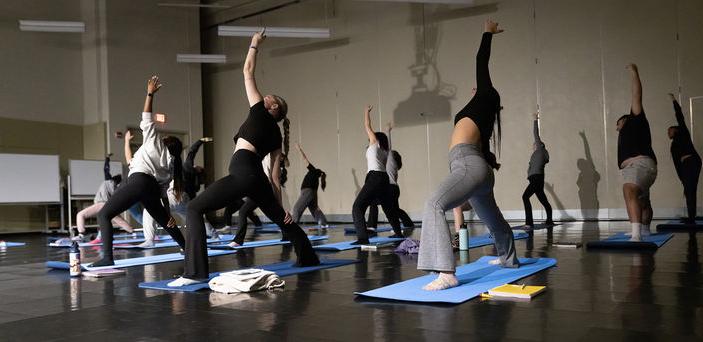
I’ve seen a tremendous increase in student anxiety and mental health issues that have been really exacerbated by COVID. I wanted to create a course that would give students some tools to manage crises and provide them with the science that backs those up.
In her first semester of college, Kealey Johnson, ’26, knew she’d face stress as she adjusted to a different environment. But thanks to one of her professors, Kealey knows how to effectively manage the emotional strain.
Kealey learned yoga and breathing exercises, as well as the science behind their effectiveness, in Bridgewater State University dance professor Jody Weber’s new first-year seminar.
“I knew I wanted a class where I could feel calm and not stressed out in any way,” said Kealey, a health science major and communication studies minor who now uses the techniques daily. “This class has really helped with that.”
That’s exactly why Dr. Weber created the seminar.
“I’ve seen a tremendous increase in student anxiety and mental health issues that have been really exacerbated by COVID,” Weber said. “I wanted to create a course that would give students some tools to manage crises and provide them with the science that backs those up.”
Weber’s seminar is one of several classes for first- or second-year students focused on mental health and wellness. In the Department of Health and Kinesiology, Dr. Lydia Burak emphasizes how physical and mental health are closely intertwined as part of a general wellness seminar. Eric LePage, a communication studies instructor, has students examine the impact of technology on their wellbeing.
LePage, who is also executive director of BSU’s Teaching and Technology Center, developed the course with a focus on social media use and its effect on consumers. As social media platforms and apps grew in number and popularity, students worried about how social media affected their wellness.
“They want more control over their social media and smartphone app use, more time for the things that are important to them in their lives,” said LePage, who recommends turning off notifications on one’s phone.
All social media is not bad, LePage tells students. Rather, they should assess the value of apps in their lives.
“By finding more of a balance with our tech use, my goal by semester’s end is that they will have greater focus and more time for the things that are really important to them, like completing their course work and degree, being creative in their free time, enjoying time with family and friends, and just being happier and less-stressed people,” he said.
Students monitor their smartphone and social media use and observe how the technology affects those around them. They present on what their life would be like in 1985 without social media or what the future of social media will be in 2035.
Weber, the dance professor, incorporates yoga or breathing exercises into every class meeting. She shows students how being in nature relieves stress. As a writing-intensive course, students also research how yoga affects veterans, college students and other populations.
“My goal is really to help students know they have control and the tools as they navigate their young adult lives,” she said. “These are lifelong practices to help them.”
Abigail Urda, ’26, said the course is a way for students who are uncomfortable seeking counseling to learn about stress and improve their wellbeing.
“I think it’s really important because a lot of first-year students struggle with mental illness,” Abigail said. “It helps to go to a class that can help them navigate coping with these illnesses.”
Do you have a BSU story you'd like to share? Email stories@liashapiro.com.



